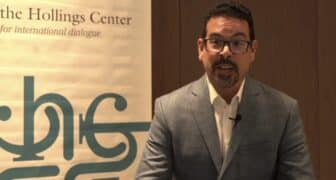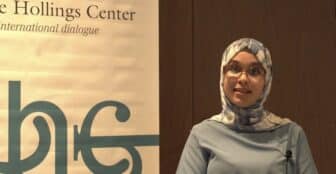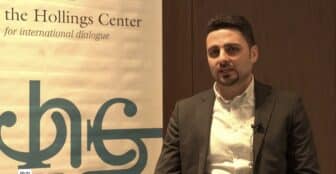How can we deploy oral history more globally to sustainably foster partnerships and exchanges of ideas across international and cultural boundaries? How can digital technology make oral history more of a public resource in the Middle East, Central Asia and the United States? What are the benefits and limitations of using memory to diagnose and troubleshoot political problems? What role does oral history play in conflict/post-conflict settings and what dilemmas do practitioners face in such settings?
To address these and other questions, the Hollings Center for International Dialogue convened a three-day Higher Education Dialogue in February 2012 entitled Oral History in the Middle East and Central Asia. Held in Istanbul, Turkey the dialogue brought together a diverse group of participants from Afghanistan, Iraq, Jordan, Qatar, Saudi Arabia, Tajikistan, Turkey and the United States. The participants represented a wide variety of professional backgrounds, among these educators, institute directors, academics, documentary filmmakers, museum curators, government officials and civil society leaders. Although participants came to the table from different backgrounds, country settings and varying levels of experience in oral history, they were united by their common interest in the field.
This dialogue snapshot highlights a number of the themes that were discussed during the three-day meeting. The goal of the meeting was not to reach consensus on how to practice oral history; rather, it was conceived as an opportunity for participants to share their ideas and experience and to explore partnerships. Four intersecting themes ran throughout the dialogue sessions.
- Crossing borders, going global: Oral history has only realized a small part of its global potential. There is lots of room for new partnerships and exchanges.
- The diverse uses of oral history:Oral history methods have many uses—from challenging written history to diagnosing political problems. Although dialogue participants did not see the purpose of oral history in the same way, it was remarkable to note how similar and compatible their methods are.
- Working in conflict settings: A number of participants work in settings that have experienced political violence and war. While each setting is necessarily unique, participants exchanged fruitful ideas about interviewing in conflict areas.
- Technology as burden and benefit: Advances in technology make it easier to disseminate oral history projects. But these advances mean that practitioners must now make critical ethical and archiving decisions at the outset of their projects.



